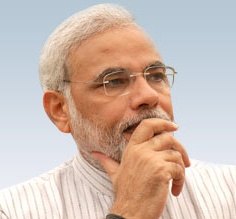Narendra Modi: ‘chaiwallah’, chief minister to prime minister
16 May 2014
 When Narendra Modi takes over as the 14th Indian Prime Minister, he will be the first premier to have been born in independent India.
When Narendra Modi takes over as the 14th Indian Prime Minister, he will be the first premier to have been born in independent India.
Born on 17 September 1950, Modi represents a new generation of non-Congress leaders who could reshape Indian polity.
Unlike many previous Indian PMs, Modi comes from a humble background.
He was the third of six children of Heeraben and Damodardas Mulchand Modi, who eked out a living in Vadnagar in Gujarat's Mehsana district.
As a teenager, Modi helped his father, who had a small tea stall outside Vadnagar railway station and the local bus terminus.
The future prime minister sold tea to passengers in trains and buses passing through the town.
But even before he could complete his schooling, his orthodox parents had him engaged at the age of 13 to Jashodaben. Five years later, the two were married, but it was never consummated, according to Nilanjan Mukhopadhyay, his biographer.
Modi decided to leave home and travel across India for about two years including in the Himalayas. After he returned to Gujarat, he took up casual jobs at state transport canteens, again selling tea.
At a very young age, Modi had come in contact with the local unit of the Rashtriya Swayamsevak Sangh (RSS) and enrolled as a volunteer.
When he was 20, he became a full-time activist, even doing a stint in Nagpur, the headquarters of the organisation. He was then given charge of the Gujarat unit of the Akhil Bharatiya Vidyarthi Parishad, the student wing of the Sangh outfits.
During the Emergency, Modi went underground and distributed pamphlets along with other RSS workers and others in the Jayapakash Narayan
movement. While his education had been cut short after schooling, he continued it later, acquiring a degree through distance education.
Later, Modi also obtained master's in political science from Gujarat University.
His first exposure to national politics came in 1988, when he was elected organising secretary of the Gujarat unit of the BJP. Three years later,
Modi helped organised senior BJP leader Murli Manohar Joshi's 'ekta yatra' from Kanyakumari to Srinagar.
The party leadership noticed his organisational skills and elevated him as national secretary of the party, posting him in New Delhi in 1995. He was
given charge of the party's activities in Himachal Pradesh and Haryana.
Three years later, he was promoted as general secretary (organisation) and his efforts led to the BJP winning assembly elections in Gujarat a few years later. The BJP leadership decided to promote Modi as Gujarat chief minister in 2001, when the Keshubhai Patel administration in the state was facing a lot of problems.
BJP leaders Atal Behari Vajpayee and L.K. Advani wanted Modi to become the deputy chief minister and gradually take over from Patel as he lacked experience in government; however, the restless Modi refused to work under the unpopular Patel's shadow. The BJP leadership relented, making him the chief minister in October 2001, just a year before assembly elections were to be held.




















